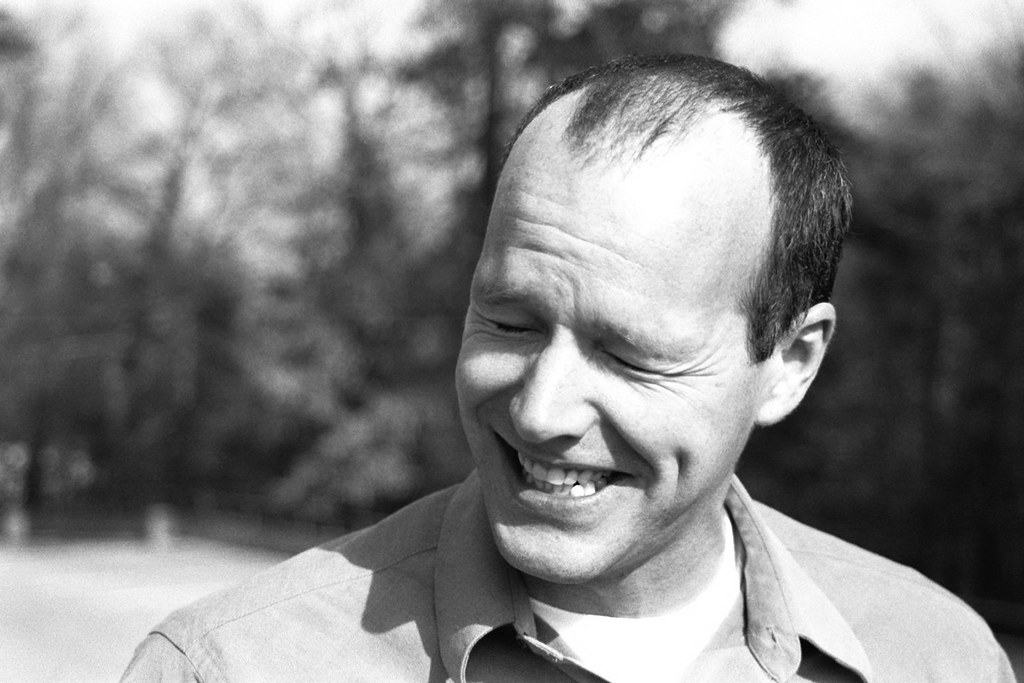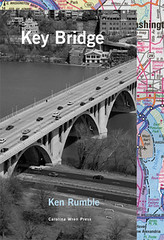The 2005 - 2006 season of the Desert City is over; I can't imagine going out with more of a bang than Rosmarie Waldrop, Emmanuel Hocquard, and Juliette Valéry. It was astounding -- really the best reading I've ever hosted (with some stiff, stiff competition in the mix.) Emmanuel read, in French, from
A Test of Solitude while Rosmarie read her English translations. It's wonderful work; spare, spare poetry that is unsuccessful at dampening the joyousness underneath the abstract postulating. As much as Hocquard wants to (and I don't think he actually
wants to exactly) find some baseline for language, the world keeps intruding, keeps demanding to be there regardless of how we talk of it.
Juliette read some ekphrastic work in French; I didn't understand it, but I enjoyed hearing it. Juliette and Emmanuel co-direct Un Bureau sur l'Atlantique (A Desk on top of the Atlantic, I learned) which, among many things, works to translated contemporary US avant poets into French. Emmanuel ran a press called Orange Exports (I believe) for awhile that did the same thing. Juliette seems to be the main translator these days, and she arrived with a big bag of books that contained her translations. I went home with a copy of Rod Smith's terrific Buber poem. I'm thinking about translating the French back into English to see what happens.
Rosmarie read first from
Love, Like Pronouns and then from
Blindsight. Wow, Rosmarie is incredible; her poems pop with just the right blend of abstract philosophy and tactile human reality. Whereas the images in Hocquard's work have been whittled down to the minimum, Rosmarie combines the philosophy and image together often in the same line. It was a great pleasure to spend the last several days (they arrived thursday night) with the three of them.
And so another season is over; season five is just around the corner; already I've got some folks lined up: Rae Armantrout, Charles Alexander, Will Alexander (probably), Evie Shockley (probably), Chris Salerno likely from the local crowd; mostly the plans are in the air, but damn they've got a knack for settling down well.
One thing I am happy to say is certain about next year: my good friend Chris Vitiello has joined me as the Co-director of the Desert City. Chris is a good friend and great poet. I'm looking forward to having his energy and ideas to help guide the Desert City into that latter half of the first decade of the 21st century.
Todd and Laura had us all over after the reading; Rodrigo Garcia Lopes, Chris V., and myself all read (and Rodrigo played some songs.) Food was drunk, wine was eaten, my parents told everyone stories about my potty training, and we all went home in a daze.
Lots of love to lots of people for a great year.
As CV's first duty as co-director, he took the introduction reins for Emmanuel & Rosmarie' below are his fine introductions:
This spring, Randall and I have been typing sentences.
That’s not typing like on a typewriter, but categorizing sentences into types, and then using those types as such, or reading the work of others with those types in mind, to see if an idiosyncratic or authorial logic will become evident.
I’m not sure where Randall is with his list of types, but I’ve seen long bulleted lists in his notebook. Myself, I’m a simple man, and I’ve settled into four sentence types that seem to have all other kinds of sentences subcategorized within one or more of them. I’ve been using this quartet as a blunt object on my writing. My types are:
• direct commands
• fact statements
• direct observations
• questions
I’m not sure that questions is actually a type, because you can write a sentence of one of the other three types as a question, but…
The consequence, for me at least, in this typing endeavor, is that my writing has become so artificial that it goes flat sometimes. I find it to be exactly what I set out to write, and really quite dull, at the same time.
Now, I am resolved and committed to artifice. I always want to be aware that language is a system of inherently arbitrary and meaningless signs linked metaphorically to signifieds, and that poetry is a tradition with sets of inherently arbitrary and meaningless conventions and assumptions. A critic once dismissed the work of John Baldessari with the comment “That’s not art; that’s just pointing at things.” Well, I point at things, and I point at the pointing. It’s what I do. And now I am able to write three, or perhaps four, kinds of sentences.
Now, Rosmarie Waldrop likewise points and meta-points, and her writing is overwhelmingly conceptually and aesthetically rich and vibrant. It’s an energy transfer. I sit down at the desk to read from
The Reproduction of Profiles, and before I know it I’m outside the house, walking, with the book open in my hand, looking for trees to climb or something. How does she do it?
In her writing, the inextricable artifices of language and poetry are not assumed to be transparent. She is complicating the language at all turns, and in a way that not only reveals the language as a code, but reveals code itself as an artificial system. These prose poems in her trilogy
The Reproduction of Profiles,
Lawn of Excluded Middle, and
Reluctant Gravities continuously open as you read them, and they meta-open as well.
Two sailors throwing dice on the quay will not make a monument, but there you sat reading a paper in its shadow. You said once we had a language in which everything was alright, everything would be alright, and your body looked beautiful while a fisherman tied his boat to a post, looping his rope through the rings without getting tangled in problems of representation or reflection. Nobody looked at you except for the water which, though it has no shape, is heavy with mirroring that of others. These images, however, are hard to get hold of, sunk as they are at the bottom of the alphabet.
You can read this as narrative prose, enjoying the interpersonal and romantic twists of the I and the you. You can also read it as an essay on, and an example of, problems of representation and reflection. Or you can admire the aesthetic and conceptual craft of the ornate shifts and transfers from one philosophical issue to another – several in every sentence. These poems are not so much accessible as imminently available, receivers rather than transmitters of ideology.
Hers are the kinds of books in which the word count of your marginalia would exceed her primary text. When you read Waldrop’s work, you de-condense her condensation, and this is how the energy transfer happens. And you can unpack these poems in many different ways, setting up very different residences in the poems in the process.
Only a person who contains multitudes can make these kinds of artifacts, and Waldrop indeed contains multitudes. I don’t know how many books she has written (I have more than 10 in my library) or how many she has translated (again, more than 10 such books in my house) or how many she has published (easily I have 30 Burning Deck books), but these numbers do not matter. Rosmarie Waldrop is someone who gives. She has devoted a life to readers, to those who read.
And tonight, she will read for us. Please welcome Rosmarie Waldrop.
In the opening of his 1947 essay “My Creative Method,” Francis Ponge writes about his disappointment in ideas:
Ideas as such seem to me what I am least fit for, and they interest me little. You may well reply that right now we are dealing with an idea (an opinion)… However, ideas, opinions, strike me as determined in each of us by something quite different from free will or judgment. I don’t know anything more subjective, more epiphenomenal…
On the other hand, objects, landscapes, events, individuals of the external world give me much pleasure. They win my trust. For the simple reason that they don’t need it. Their concrete presence and evidence, their density, their three dimensions, their palpable undeniable aspect, their existence – all this is my sole justification for existence, or more precisely, my pretext; and the variety of things is what constructs me.
At first this seems very similar to the William Carlos Williams “No ideas but in things” concept, but Ponge extends it. He establishes a category in the interstice between ideas and things that he calls “observations, or… experimental ideas” – he’s using the word experimental in a scientific rather than aesthetic sense here. It seems to Ponge that he can agree on certain established facts and definitions because these are both abstract and phenomenal, though he acknowledges that language gets in the way here:
Why is there this difference, this unthinkable margin between the definition of a word and the description of the thing designated by the word? Why is it that dictionary definitions seem to be so woefully lacking in concreteness, and descriptions (in novels or poems, for example) so incomplete (or else too specific and detailed), so arbitrary, so capricious? Couldn’t one imagine some kind of writing (brand new) which, placing itself more or less between the two (definition and description), would borrow from the former its infallibility, its indubitability, and its brevity; and from the latter, its respect for the sensory aspect of things…
Quite simply, Emmanuel Hocquard produces this “brand new” kind of writing, not by locating it between the poles of definition and description, but by commuting or vacillating between them at an ultrasyntactic speed that makes a connection. This is the eighth sonnet in
A Test of Solitude:
Viviane, there has been the canale, and there is
the burnt stump.
Between the two, thirty paces, seventeen iron-
woods and eight seasons gone by.
What operation in mathematics or logic can
count at the same time in meters, trees and
years?
Should one even try?
Would somebody with sense go and add up
bread and feeling?
It’s like saying: I remember the islands.
Here, however, is an intention, tied to a film
project – the sequel of the voyage – a matter
of going from the canale to the burnt stump.
By writing in this brand new way, Hocquard extends Ponge’s extension of Williams, into an ethics.
This is a little reductive, but instead of taking Williams’ objectivist opposition of ideas and things, or Ponge’s phenomenologically framed poles of definition and description, Hocquard nests these oppositions into the operational area of interrogation, and posits the impossible area of negation all around it. Hocquard is not presenting a way to think, or even a way to write – he’s presenting a way to exist, even while acknowledging the fundamental lack of an explanation of, or purpose for, existence. Let’s face it, being alive is difficult (interrogation), but what’s the alternative (negation)?
Hocquard’s book
Theory of Tables is his equivalent to Ponge’s essay “My Creative Method.” In its afterword, Hocquard describes his method for writing the book. In his travels he collected pebbles, beach glass, fallen bits of facades -- fragments of the external world – placing them in white envelopes upon which he noted the time and place of their collection. Later, he emptied the envelopes out, separately, onto tables, and contemplated them, writing his observations and interrogations. As he says, “I had become, in sum, the translator of pebbles.”
Here is the 34th sequence of the book:
A name becomes clear
A name is extinguished
You had a name for this
You don’t remember which anymore
you have lost this name
can this take its place?
This is not an image of this
If the reply is this
what is this? is a question with no object
A question has no object
Does this clarify this?
Please welcome Emmanuel Hocquard.


